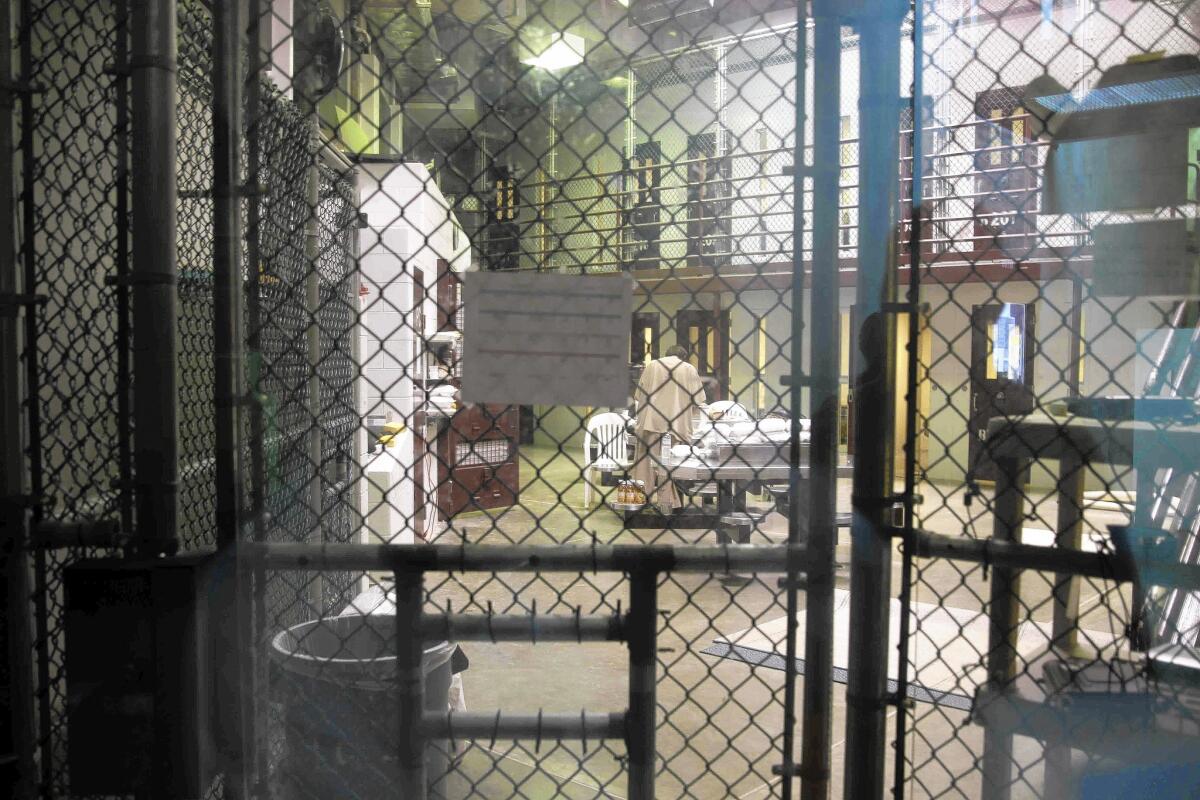White House plans more transfers from Guantanamo prison

The White House is making plans to transfer more detainees from the U.S. military prison at Guantanamo Bay despite the mounting political furor over the exchange of five Taliban prisoners for Army Sgt. Bowe Bergdahl, officials said Tuesday.
Caitlin Hayden, spokeswoman for the National Security Council, said the White House was “making progress on a number of additional promising opportunities” to transfer more prisoners and that officials were reviewing Yemeni detainees “on a case-by-case basis.”
“While we do not generally discuss transfers before they take place, we are fully committed to implementing the president’s direction that we transfer detainees to the greatest extent possible, consistent with national security and our humane-treatment policy, as we work toward closing the facility at Guantanamo Bay,” she said.
Hayden said 17 inmates had been moved out of Guantanamo in the last 13 months, including the five former Taliban officials transferred to Qatar in the swap for Bergdahl.
The future of America’s most notorious prison camp, and its 149 remaining inmates, has been in doubt since the White House announced the exchange May 31.
But President Obama, who has sought unsuccessfully to shut the U.S. military prison in Cuba since he took office, hinted strongly last week that he still intended to move more detainees out as the Pentagon winds down its war in Afghanistan.
“By definition, if we in fact are ending a war, then there’s going to be a process in which some of those individuals are going to be released,” he said on NBC News.
Exactly how remains unclear. Although Congress has allowed the transfer or repatriation of hundreds of detainees in recent years, angry lawmakers now are threatening to put up new roadblocks, even for the several dozen inmates approved by military courts for release back to their home countries.
Defense Secretary Chuck Hagel is to testify Wednesday before the House Armed Services Committee, the first public hearing to focus on the transfer of the so-called Taliban Five to the government of Qatar, which helped negotiate the deal. Hagel is expected to face harsh questions on the administration’s plans for future transfers or releases.
After closed-door briefings by senior administration officials this week, some Republican lawmakers said they thought the White House intended to release more prisoners at some point without seeking congressional consent, as in the Bergdahl case.
“There’s some concern that this is a lead-up to letting them all go,” said Rep. Howard P. “Buck” McKeon (R-Santa Clarita), chairman of the House Armed Services Committee.
“I think it’s a foreshadowing of their thinking,” said Rep. Peter Roskam (R-Ill.), the GOP’s chief deputy whip. “They’ve just released five. It begs the question: Do they propose to release more?”
Although Hayden said Obama remained committed to closing the prison, she said an interagency review board had begun to look at “whether continued law of war detention of certain Guantanamo detainees is necessary to protect against a continuing significant threat” to the United States.
“In this way, we will ensure that any continued detention is carefully evaluated and justified,” she said.
Before a detainee can be released, the administration must obtain security and humane-treatment assurances from governments willing to accept him. That is in addition to a 30-day notification to Congress, which has barred bringing any of the men to the United States to stand trial in civilian courts.
The prison, created in January 2002 to hold foreign captives suspected of links to Al Qaeda and other terrorist groups, is part of a U.S. Navy base in southeastern Cuba. It held 770 detainees at its height.
Most of those remaining have been held more than a decade without trial. Among them are several charged with war crimes, including Khalid Shaikh Mohammed and four others charged with planning and aiding the Sept. 11, 2001, terrorist attacks.
The controversy over the Bergdahl swap has set the White House on its heels, putting administration officials on the defensive for a second week.
Obama “spent a lot of political capital releasing the Taliban Five in exchange for Bergdahl,” said Charles Stimson, head of the national security law program at the Heritage Foundation, a conservative think tank, and a former advisor on detainee affairs to then-Defense Secretary Donald H. Rumsfeld. “Now he’s going to have to figure out a way to spend his remaining political capital on getting the rest of it done.”
The fact that the White House didn’t consult Congress as the latest prisoner swap was organized “makes anything else he wants to do at Guantanamo more difficult,” Stimson said.
That challenge may have grown steeper Tuesday.
Josh Earnest, a White House spokesman, acknowledged that about 80 or 90 people in the White House, Pentagon, CIA and other administration agencies knew of the prisoner exchange last weekend, before members of Congress were informed.
Making a number of phone calls “around town” would not have been “a prudent decision,” Earnest said.
Many lawmakers don’t accept the White House argument that the U.S. military withdrawal from Afghanistan necessitates the repatriation of prisoners, as is usually done after war’s end.
A dozen Afghans are still held at Guantanamo: four slated for indefinite detention, four approved for transfer and four referred for prosecution by military tribunals.
“This absolute untruth that they are purveying, that these people are going to be released anyway, is absolutely false,” said Sen. John McCain (R-Ariz.), who has called for closing Guantanamo Bay but has emerged as one of the administration’s sharpest critics on the recent swap.
“I want to close Guantanamo, but I want to put those people into a secure facility,” he said. “That doesn’t mean I want to release them back to commit more acts of terror.”
Lisa Mascaro in the Washington bureau contributed to this report.
More to Read
Start your day right
Sign up for Essential California for news, features and recommendations from the L.A. Times and beyond in your inbox six days a week.
You may occasionally receive promotional content from the Los Angeles Times.








